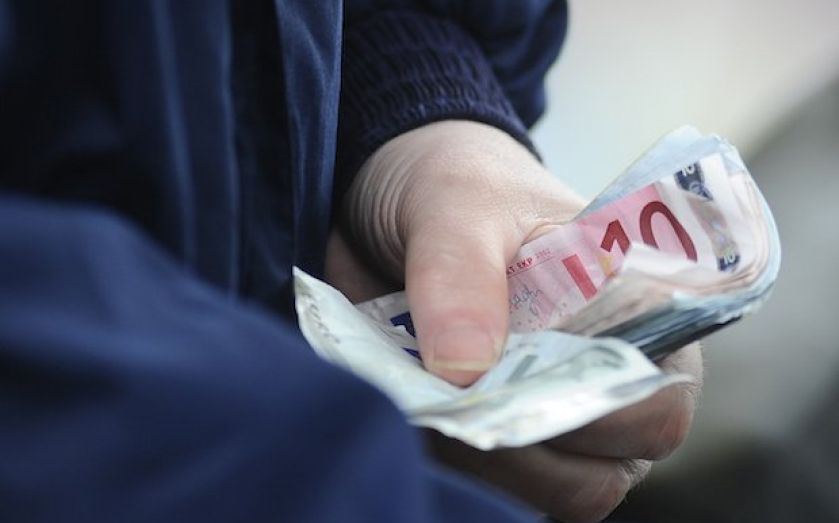Globalisation lay behind the Eurozone crisis – but it has also rescued the euro

THE ARCHITECTS of the European single currency apparently paid little heed to globalisation or the rise of China. The Delors Report in 1989, which set up economic and monetary union in Europe, didn’t mention either of them. Nor did the first official European proposal for monetary union, the Werner Plan in 1970.
In retrospect this looks a huge omission. This is because globalisation has proved to be a huge asymmetric shock to the Eurozone. An asymmetric shock is one of the things that creates real problems for fixed exchange zones, because it is an economic shock that affects the different parts differentially.
One way of looking at this is to use the World Bank’s measure of trade complementarity. This is a complex measure, which considers whether the exports from one country are more likely to compete with exports from another. It shows that 46 per cent of German exports are complementary with Chinese goods, whereas only 22 per cent of Irish exports are such. The Germans make things like machine tools and high-quality cars that the Chinese want to buy. At the other extreme, the textile industry, which not so long ago was a staple part of industry in southern Europe, has all but been wiped out in the Eurozone (except at the high end) by competition from low cost producers.
And compare Italy and Germany. The Italian economy today is slightly smaller in real terms than it was in 2000, just after the euro started. The German economy has grown by 15 per cent.
Normally, exchange rate flexibility is one of the cushions to the pain of asymmetric shocks. But in a fixed exchange rate system, this isn’t there. Instead, countries have to rely on internal devaluation, which is a painful process since it damages domestic consumer spending at the same time as it boosts exports and curbs imports.
Europe’s lack of competitiveness against the rising tide of products from an increasingly prosperous Asia and other emerging markets – which have developed so fast they have not yet had the time to get fat and lazy – has led to growth being at best disappointing, and at worst (as in Italy) non-existent. In 1998, Western Europe was 30.1 per cent of the world economy. By 2028, the Centre for Economic and Business Research (CEBR) forecasts this will have more than halved to 14.5 per cent.
This has created the second Eurozone problem – government debt. Excessive spending in relation to lower-than-expected GDP has meant deficits which have cumulated to create unsustainable debt. Although the structure of the euro, with its lax fiscal discipline, meant that the consequences of excessive spending were only faced after a long delay, these problems would have had to be addressed at some point in any case.
So globalisation was behind the euro crisis. But globalisation has also rescued the euro.
The composition of the Chinese government’s huge accumulated portfolio of overseas assets is a state secret, though their total – at $3.8 trillion in January 2014 – is not. But a reasonable estimate is that not far short of 40 per cent is now invested in the Eurozone in some way. This compares with an historic share of close to 30 per cent, and far outweighs the Eurozone’s importance in the world economy.
This investment is what has caused the euro crisis in the financial markets to go away. There is no shortage of conspiracy theories for why the Chinese might like Europeans to be in their debt. But China’s support for the euro is in China’s interest anyway. The Chinese have never liked the dollar’s status as the main reserve currency, and therefore have a strong interest in strengthening rivals. But this policy is given added momentum by the gradual emergence of China’s renminbi (RMB) as a major currency in its own right. The RMB will eventually be the world’s first or second currency, but is currently held back by its limited acceptability. It makes sense for the Chinese to support the euro as an alternative to the dollar until the RMB becomes more internationally tradeable.
So globalisation was probably the single most important explanatory factor behind the euro crisis. But it was one of the consequences of globalisation – the Chinese accumulated reserves – that saved the euro from being wrecked as the markets took against it two years ago. This doesn’t mean that the future of the euro is assured. Ultimately, it will depend on whether the Germans can vote for subsidising southern Europe (of which France is likely to be an increasingly important part) in perpetuity, and on whether southern Europe will accept German and northern European economic sovereignty.
Douglas McWilliams is executive chairman of CEBR and the Mercers’ School memorial Gresham professor of commerce. He will discuss this issue further in “Can the Euro Survive Globalisation”, a Gresham lecture held tomorrow at 6pm in the Museum of London. Seating is on a first come first served basis.